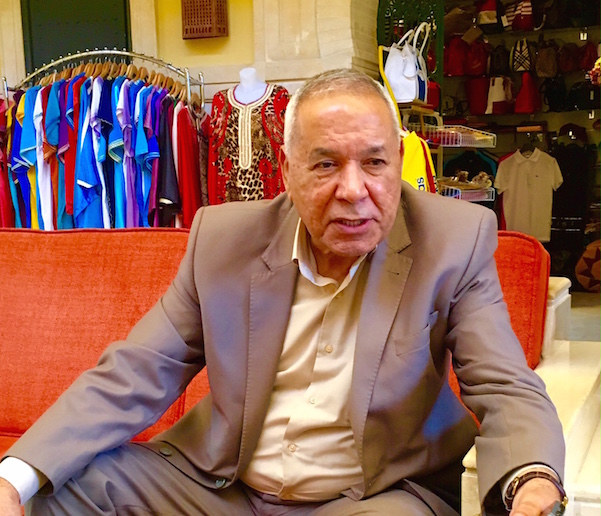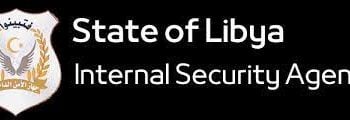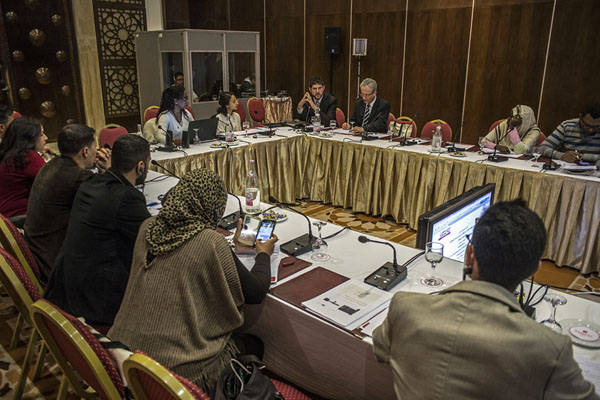By Michel Cousins.

Tunis, 16 November 2o15:
Benghazi politician Abubakr Buera, who was one of the four members of the team from the . . .[restrict]House of Representatives (HoR) at the UN-brokered Libya Dialogue negotiations, has accused outgoing UN Special Envoy Bernardino Leon of dishonesty and seriously damaging the work of Dialogue.
Speaking in an interview in Tunis with the Libya Herald, he also said that the HoR was dangerously divided between the south and west of the county on the one hand and the east on the other over the proposed Government of National Accord and the October versions of the Dialogue agreement. If the parliament were to be a vote on the deal now, he said, it could drive the country into partition by default. The HoR needed a cooling off period to consider the options, he insisted. A vote now posed too great a risk.
Buera, a leading opponent in the HoR to the final Dialogue deal, said he and others in the parliament were shocked that Leon had been negotiating with the UAE for his new job as head of its diplomatic academy when it was a party to the Libya crisis and he was supposed to acting as an impartial mediator.
“We were really surprised to hear about them [the allegations]. We never expected Leon to be a broker for his own interests. We always believed in him as a peacemaker. We never expected him to behave like this,” he said. “He really let us down.”
Leon’s action, had “massively damaged the UN’s credibility”, he declared.
“He messed things up completely. It’s caused uproar. People, especially in eastern Libya, resent him.” As a result, a large section of the Libyan population had lost have lost confidence in the UN, he believed.
He accused the envoy of deception in preventing him taking part in the final Skhirat negotiations. “He was not honest with me”, Buara said. Leon, he said, had asked him to stay away from last Skhirat meeting on grounds that he was going to propose him for the government and that it would have been inappropriate for him to attend. So, he explained, he remained in another hotel. But he was not nominated. The real reason, Buara claimed, that that Leon wanted to keep him out of the meeting.
“I think he took wrong advice from some people,” and rushed the final fence, he said, adding that he believed Leon was “under pressure” from others to quickly finish the job.
As a result, the project had collapsed. “Now we have to restart anew. Maybe not from square one, but we’ll have to go back.”
On the HoR not meeting to vote on the deal, Buera said it was absolutely necessary.
“There is a massive rift among HoR members about the formation of the GNA,” he said. If the parliament insisted on a decision now and a majority then said yes to the GNA, it could tear the country apart, he warned. “In eastern Libya we totally refuse the approach taken by Leon and the names he has suggested.” The easterners would respond by electing a separate president and government but which would ending up being a government purely in the east. Libya could be propelled into partition by default. “We have to avoid this,” he said.
Everyone in the HoR agreed that there had to be a GNA – “we have no alternative” – but there had to be “a cooling off period to avoid the country going to partition”.
“We are postponing the sessions to give the HoR members time to understand each other,” he said.
At no point speaking of “Cyrenaica” but rather of “eastern Libya” despite being labelled by his opponents as a federalist, Buera said that eastern members of the HoR wanted a new roadmap, adding that one of their main objections to the names presented by Leon was that they were weak.
“They remind us of the previous governments of Zeidan and Al-Kib. We’ll go back to what happened before, a government that does nothing”.
He rejected, however, any suggestion that the more-than-a-year in Dialogue negotiations had been a waste of time. “We ended up having a good framework for political process. We achieved things.”
But Leon, by acting “prematurely”, had “messed them up”.
“From the beginning we had been discussing how we could have a government that would be effective, efficient, that could deliver, not a government that was based on social groups and personal interests.”
That, he claimed, is what Leon had proposed.
And being weak, nothing would be done to stop corruption, he said. “The old public money thieves will be back again to steal whatever money Libya is left with,” he claimed.
As to the road map wanted by eastern members, the one thing they were not interested in, he insisted, was a military council led by Khalifa Hafter.
“There are calls on the street for this, but not in parliament. It does not want to appoint a military council.”
Nonetheless, Buera agreed that Libya presented “a very bleak picture” at present. “It’s a very fragmented country,” but adding that that “we’re still hopeful. We’re trying to put it together.”
Regarding his own position, he said he had resigned from the Dialogue for two reasons: one was in protest at what he called the silence of other members over Leon’s treatment of himself; the other because he had became tired of the constant criticism from others in the country when he had been trying to make the Dialogue succeed.
He firmly denied allegations that he was in Tunis to meet Leon and do some deal. “I have nothing to do with him anymore”, he insisted. [/restrict]










